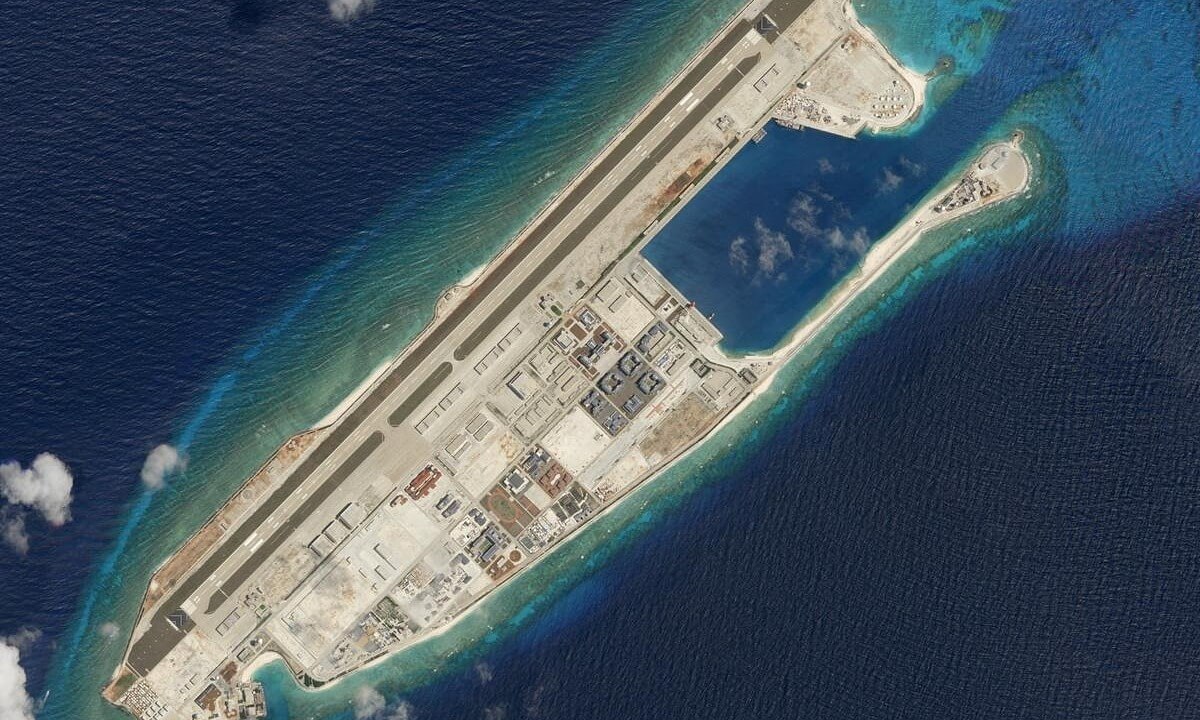A new report by the Centre for Strategic and International Studies’ Asia Maritime Transparency Initiative claims that Vietnam has been building up its air and coastal defence capabilities against China on its bases in the disputed Spratly Islands archipelago for the last two years. The Washington-based think tank asserts that Vietnam, whose ownership claims of the Spratly Islands archipelago in the South China Sea is challenged by China, has also been scaling up its defences against Beijing. While Beijing’s latest legislation on maritime sovereignty infringes on the sovereignty of other riparian states, Vietnam has been making upgrades by installing newer and longer-range weapons systems. According to the report, this includes installing artillery rocket systems acquired from Israel at West Reef and Sin Cowe Island over the last two years in order to “ensure it can strike Chinese facilities”.
Vietnam has also put up signal towers and administrative buildings on the 70-acre landmass at West Reef during the last two years. Administrative buildings were also constructed on Grierson Reef and Central Reef. In addition, satellite imagery shows that the country has built defensive installations along its northern coastline of Sin Cowe. “The coastal defence installations – concrete emplacements often connected to a bunker – are ubiquitous at Vietnam’s larger outposts,” the report says.
Further, Vietnam also installed additional radomes, which are “dome-shaped structures used to protect radar antenna and several administrative buildings”, at Pearson Reef and Namyit Island. “The small size of these systems would make them easy to quickly deploy and conceal. They require minimal supporting infrastructure and could be fired … probably from any other reasonably flat, hard surface…That means they could easily be present at any, or all, of Vietnam’s 10 largest islets.” the report explains.
Meanwhile, the Philippines, which also has territorial disputes with China and is therefore wary of its new coastguard law, announced that it would be enhancing its maritime defence capabilities. In the latest development, on Saturday, Major-General Edgard Arevalo, the spokesperson for the Armed Forces of the Philippines (AFP), said that the AFP was “unmoved” by China’s new coastguard law and was “resolute in protecting” the country’s maritime domain. Similarly, the Philippines, which contests China’s Nine-Dash Line, has been scaling up its defences against Beijing. Major-General Arevalo of the AFP said this weekend: “We will pursue our constitutional mandate and consistently assert our sovereignty in the West Philippine Sea. The protection of our territory and the upholding of the interest of our people is our primary interest.” The general also added that “We will be, as we have always been, resolute in protecting our maritime domain, regardless of what laws other countries may pass.”
This follows other similar comments made recently by the other officials of the AFP. Two weeks ago, the Philippines’ new military commander, General Cirilito Sobejana, said that the country would be increasing its naval presence in the South China Sea in response to China’s controversial new maritime law. “[T]he pronouncement of China that their coast guard can open fire on people intruding into their territory is very alarming… Our compatriots do not go to that disputed area to make war, but for livelihood. So, what we will do as part of our mandate to secure the people is to increase our visibility through the deployment of more naval assets,” said Sobejana.
These developments come against the backdrop of China’s new coastguard law which was introduced on January 22. China’s top legislative body, the National People’s Congress standing committee, passed the controversial Coast Guard Law, which grants permission to the Chinese coast guard to use “all necessary means” to respond to threats from foreign vessels. The bill, which entered into law on February 1, also specifies situations in which different weapons can be used. Moreover, the law also gives the coast guard personnel the power to “demolish structures” built by other countries’ on reefs claimed by Beijing and to “board and inspect foreign vessels” in waters claimed by China. Chinese foreign ministry spokesperson Hua Chunying defended the bill saying that the law was “in line with international practices” and was nothing but “normal domestic legislative activity”.
Vietnam and Philippines Assert Sovereignty Against China in Disputed Waters
Vietnam has been enhancing air and coastal defence systems on bases in the Spratlys, while a Philippines’ army official declared that the country is “resolute in protecting” its maritime domain.
February 23, 2021

SOURCE: PLANET LABS INC/REUTERS
